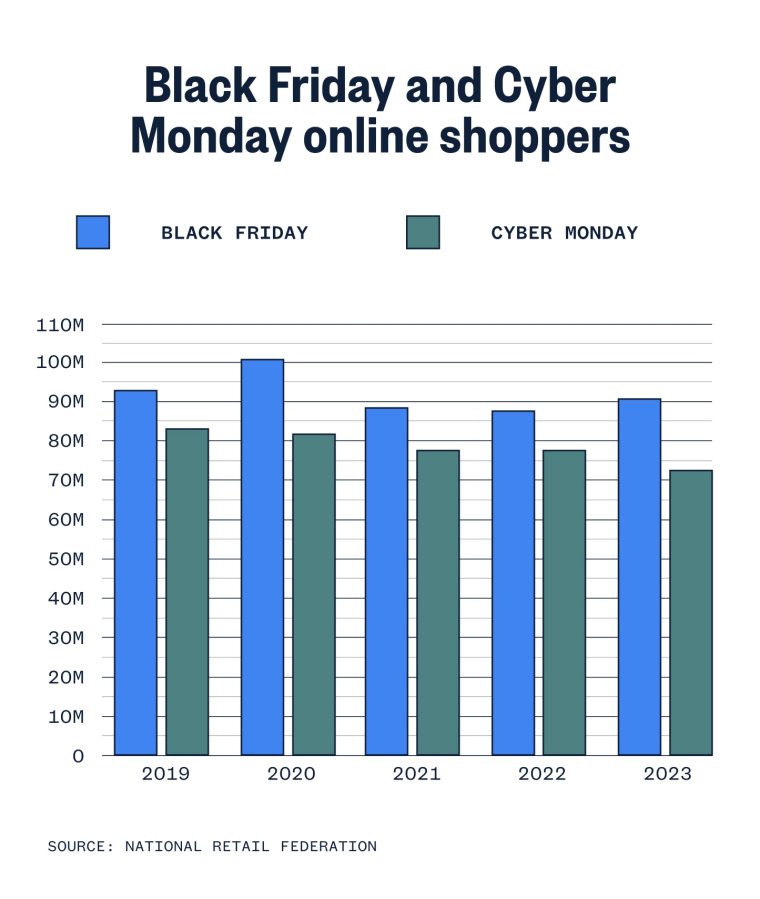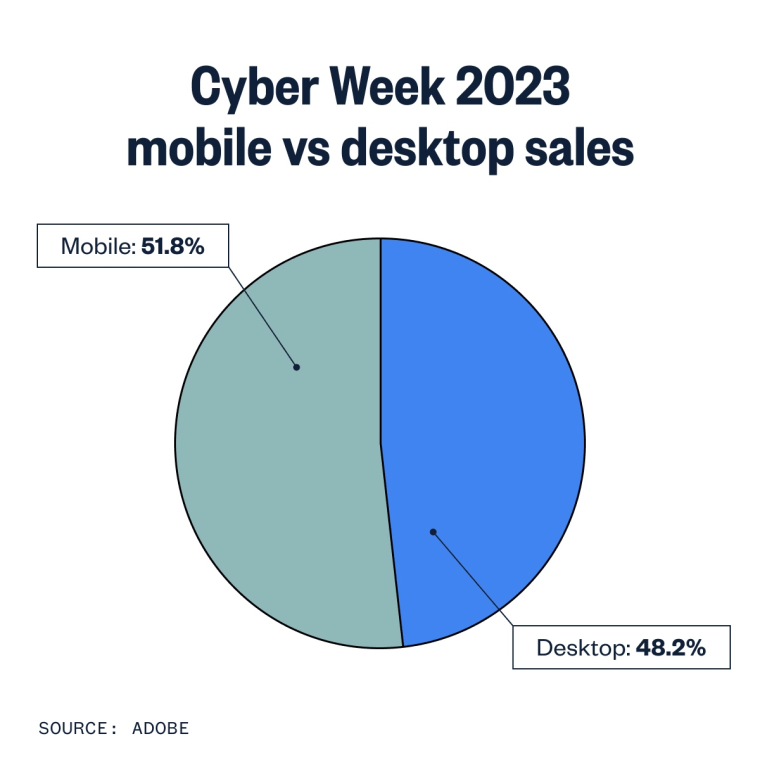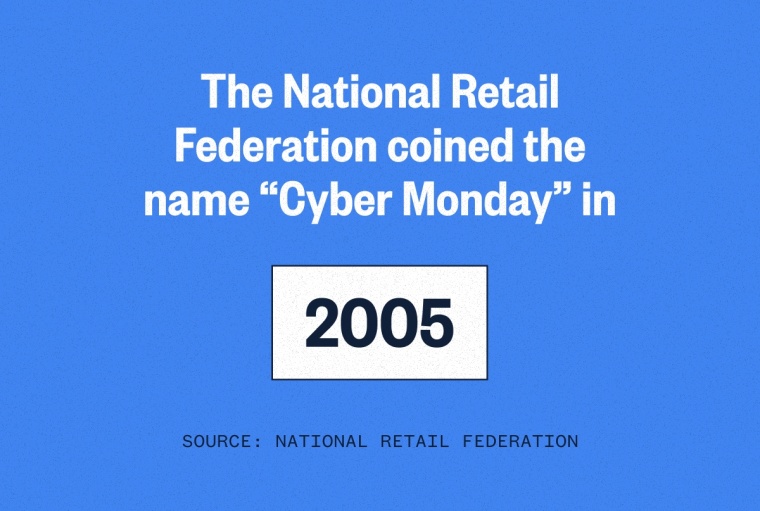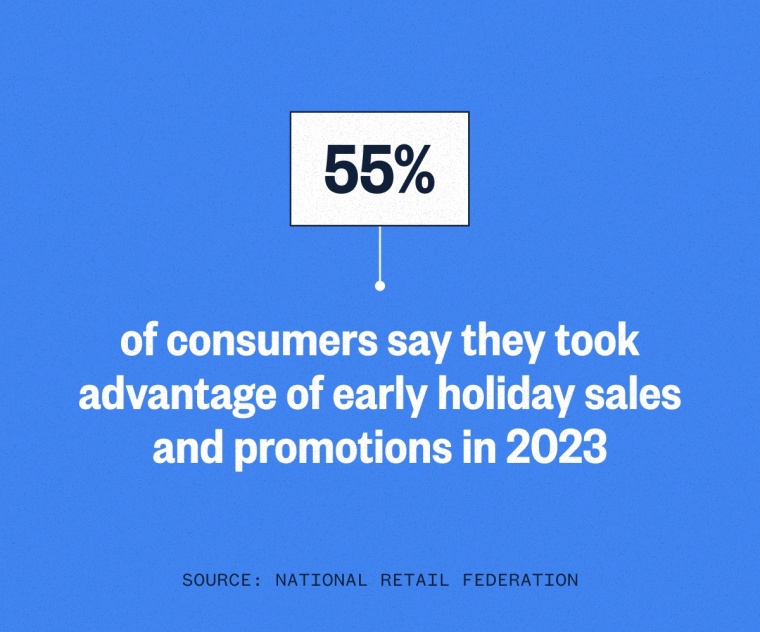Online shopping was booming in the years leading up to 2005, when the National Retail Federation (NRF) first coined the term “Cyber Monday.” Amazon was founded in 1994, eBay launched in 1995 and Walmart debuted its website in 2000 — shoppers quickly grew accustomed to adding items to a virtual shopping cart rather than a physical one. And yet, when Black Friday came around every year, e-commerce sellers felt left out of the revenue boost that was guaranteed for brick-and-mortar stores.
“With the growth of online shopping, online-only players like Amazon were looking for a way to capitalize on Thanksgiving weekend sales,” says Katherine Cullen, the NRF’s vice president of industry and consumer insights. “The Monday after Thanksgiving became dedicated to online sales, differentiating it from Black Friday.”
Since the first “official” Cyber Monday, the event has grown into what’s historically the most profitable day for e-commerce sales every year. But recently, retailers have expanded their online presence during Black Friday and extended their deals to be weeks long. By doing so, they’ve essentially blended Black Friday and Cyber Monday together, making many question whether there’s a difference between the shopping holidays anymore.
To help you better understand Cyber Monday, which is happening today, Dec. 2, I charted its history and spoke to experts about their 2024 predictions.
SKIP AHEAD Looking back on Cyber Mondays of years past | What to expect during Cyber Monday 2024 | How Cyber Monday came to be | The blurred line between Black Friday and Cyber Monday | Why trust NBC Select?
Want more from NBC Select? Sign up for our newsletter, The Selection, and shop smarter.
Looking back at Cyber Mondays of years past
For years, there’s been signs that e-commerce dominates the holiday retail market, even on Black Friday, which originated as an in-person shopping event. In 2019, for the first time ever, Black Friday topped Cyber Monday as the busiest online shopping day, according to the NRF. This has happened every year since, proving that one day dedicated to in-person shopping and another dedicated to online shopping is an obsolete concept. Now, the weeks leading up to and during the Cyber Five — the five day period between Thanksgiving and Cyber Monday — are an all-around shopping frenzy, whether people buy online, in-stores or both.
That said, no event set Cyber Monday up for record-breaking success like the Covid-19 pandemic did in 2020. It forced most brick-and-mortar stores to shut down, sparking a massive surge in online shopping. And when it came to the holiday season, retailers pushed online sales more than ever before. They also reformatted their Black Friday and Cyber Monday events to run for weeks throughout November, in addition to closing for in-store shopping on Thanksgiving Day. These efforts led to consumers spending $10.8 billion during Cyber Monday 2020, making it, at the time, the biggest online shopping day in U.S. history, according to Adobe.
Ever since their 2020 success, retailers have continued leaning into online sales during Black Friday and Cyber Monday, and stretching discounts across multiple weeks. But in 2021, online revenue on Black Friday and Cyber Monday fell for the first time ever by a little over 1% each, according to Adobe. Experts attribute the declines to shoppers taking advantage of early deals and spreading out their spending rather than concentrating purchases around specific days.

How early deals would impact Black Friday and Cyber Monday was experts’ main focus in 2022, especially because Amazon kicked off holiday shopping sooner than usual by hosting its first October Prime Day. But there wasn’t a repeat of 2021, and sales for both events steadily increased in 2022 and 2023. Adobe estimates total Cyber Monday 2022 sales to be around $11.3 billion and total Cyber Monday 2023 sales to be around $12.4 billion — the latter is the largest online spending day in U.S. history to date.
While Black Friday typically sees the most online shoppers, Cyber Monday takes the cake for revenue, some of which has to do with retailers designing their websites and apps to pressure shoppers into checking out, says Dr. Ross Steinman, a professor of consumer psychology at Widener University. Many advertise Cyber Monday as shoppers’ last chance to save and add clocks to their homepages that countdown the seconds until midnight. This adds a gamification aspect to the sale, motivating shoppers to be competitive while deal hunting, says Steinman.
Some say growth in retail sales over the past few years is due to inflation, but consumer demand is responsible, according to the NRF. It attributes positive performance in-part to record shopper turnout. During the five-day period from Thanksgiving Day to Cyber Monday 2023, 200.4 million Americans shopped in stores and online, the highest figure since the NRF first started tracking this data in 2017. More people are encouraged to shop Black Friday and Cyber Monday than ever before because weeks of deals make it convenient and stress-free, says Steinman. Plus, shoppers have an overall hunger for savings opportunities as economic concerns loom.
What to expect during Cyber Monday 2024
As they have in years past, experts predict that Cyber Monday sales will steadily increase in 2024, once again making it the most profitable day for e-commerce sellers during the holiday season. Adobe puts forecasted Cyber Monday sales at $13.2 billion, up 6.1% year-over-year. It expects Thanksgiving Day and Black Friday sales to grow at a higher rate year-over-year because shoppers are enthusiastically embracing early deals. However, Cyber Monday is still on top when it comes to total profits, so if everything plays out as expected, 2024 will be the biggest online shopping day in U.S. history.

One of the online shopping trends experts are closely watching this year is how much mobile sales will overtake desktop sales. During Cyber Week 2023, 51.8% of online sales came through a smartphone, up from 49.9% in 2022, according to Adobe — it expects that number to go up even more this year. Consumers are currently showing a clear preference for shopping through mobile devices rather than desktop computers and laptops, which has become a key growth driver for the digital economy. Additionally, experts are monitoring influencers’ impact on holiday season sales — so far this year, Adobe’s data shows that influencers drive people to shop 10 times more compared to social media overall.
Since so much growth is anticipated this season, the NRF forecasts between $979.5 and $989 billion in total 2024 holiday spending from Nov. 1 to Dec. 31, marking between a 2.5% and 3.5% increase year-over-year.
How Cyber Monday came to be
Cyber Monday takes place the Monday after Thanksgiving and Black Friday. The NRF coined the name “Cyber Monday” in 2005, introducing it in a press release that described a new trend the group began noticing a few years prior: Without fail, online revenue and traffic spiked the Monday following Thanksgiving. Soon after, media outlets and retailers started using the term.
Like Black Friday, Cyber Monday was a response to consumer behavior, says Barbara Kahn, a professor of marketing at The Wharton School of the University of Pennsylvania. When people returned to work on Monday after the holiday weekend, they had access to computers and the internet again (in the ‘90s and early 2000s, not everyone owned a computer or kept one at home like we do today). At work, shoppers could browse online-only retailers for deals, which gave them access to a new assortment of products they may not have found in stores, says Kahn. Retailers with an online presence in addition to their storefronts also hosted Cyber Monday sales, giving them the opportunity to reach a larger audience than just those who shopped in-person on Black Friday.

Beyond a new and more diverse assortment of deals, Cyber Monday was attractive to shoppers because it offered a convenience and flexibility Black Friday did not, says Kahn. People could shop whenever they had time on Cyber Monday. In short, you could score deals quickly and from virtually anywhere , which became part of the sale event’s novelty.
Since most people now have around-the-clock access to the internet through their phones, tablets, laptops and watches, the original rationale behind Cyber Monday is “a bit archaic,” says Kahn. But its legacy remains. Cyber Monday established a new type of holiday sale: one that occurred exclusively online and stretched out the shopping weekend timeline.
The blurred line between Black Friday and Cyber Monday
Black Friday and Cyber Monday were once distinct events — one was for in-person shopping and the other was for online shopping. But they’ve recently bled into one another. Black Friday is getting longer each year as some retailers offer sales starting in early November or even October. And Black Friday has been outpacing Cyber Monday in terms of number of online shoppers, although Cyber Monday historically grosses more revenue.
“We still use the terms ‘Black Friday’ and ‘Cyber Monday,’ but it’s evolved so far beyond that,” says Cullen. “Shopping is shopping regardless of what channel it’s occurring on, which reflects a shift in consumer and retailer thinking. They’re now shopping across multiple channels, depending on what’s most convenient for them and their lifestyles.”

This change in consumer and retailer thinking puts pressure on Cyber Monday sales to start earlier and end later. Today’s shoppers expect early deals, so many retailers begin their Cyber Monday sales weeks in advance of the shopping event itself. Then, they extend the shopping holiday on the backend, too.
Some retailers with an online presence and brick-and-mortar stores differentiate between Black Friday and Cyber Monday by highlighting different deals. Others simply change the name of their sale from “Black Friday’’ to “Cyber Monday” as the week goes by without offering new deals. That’s led some retail experts to see Cyber Monday as a continuation of Black Friday rather than its own unique shopping event, creating what experts call “Black November” to describe the month-long promotions leading up to the sale events.
Meet our experts
At NBC Select, we work with experts with specialized knowledge and authority based on relevant training and/or experience. We also ensure that all expert advice and recommendations are made independently and with no undisclosed financial conflicts of interest.
- Barbara Kahn is a professor of marketing at The Wharton School of the University of Pennsylvania.
- Katherine Cullen is the vice president of industry and consumer insights at the National Retail Federation.
- Dr. Ross Steinman is a professor of consumer psychology at Widener University.
Why trust NBC Select?
I’m a reporter at NBC Select who has covered tentpole sales like Black Friday, Cyber Monday and Amazon Prime Day since 2020. For this article, I researched the history of Cyber Monday, spoke to three experts and referred to data from sources like the NRF and Adobe Analytics.
Catch up on NBC Select’s in-depth coverage of personal finance, tech and tools, wellness and more, and follow us on Facebook, Instagram, Twitter and TikTok to stay up to date.


